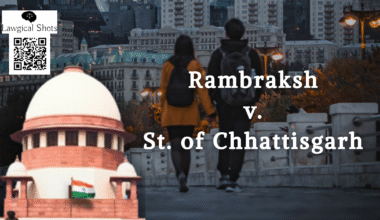There is this very famous quote – “No love is greater than mother’s love, no care is greater than father’s care”. Mother and father together lay the foundation of a child’s identity. Children often copy their parents, follow in their footsteps. This makes parenting a crucial project for parents these days. While parenting is a team work for mother and father, what happens when they themselves do not enjoy each other’s company and proceed to end their marriage? While laws mostly prefer mother over father when it comes to custodial rights over the child, does a father always lose? Here, we have compiled some important Supreme Court judgments on child custody to father which could help strengthen the case for someone out there.
Landmark Supreme Court Judgments on Custody of Child to Father
1. Poonam Wadhwa v. Ajay Wadhwa (2025)
The daughter was staying with her mother while the minor son’s custody was temporarily given to the father. The Punjab and Haryana High Court had set aside orders granting custody of the child to the mother. The other remedies under relevant statutes were left open due to pendency before Family Court.
Since counsel had argued that the father was working from home while mother had long working hours, the Apex Court supported the need of married couples to work for building proper home and securing better education for their wards. The Court interacted with the child and noticed that he was not willing to part from his father. Other elderly members of the house and his school was near his father’s place. Hence, the Court did not make any changes in child custody to father or visitation rights for the mother.
2. Karuna Nath v. Dipender Nath (2025)
The Delhi High Court in this case looked upon a case of adultery by a mother. The father got interim custody of the child as granted by the Family Court with weekly visitation rights to the mother, while application for permanent custody was pending. The mother had challenged the order granting child custody to father before the Delhi High Court.
The Court clarified that adultery alone was not a ground not to grant custody of the child to the father. However, the Court was wary of the fact that there were evidence of mother’s persistent abdication of her maternal obligations. Her absence in Court proceedings even led the Court to issue non-bailable warrants. Her continued indifference towards the guardianship proceedings led the Court to conclude that the Family Court order was well reasoned.
3. Vivek Kumar Chaturvedi v. State of UP (2025)
The child here had been living with his grandparents since his mother passed away. The father sought custody of his son. The High Court denied the same considering that the child had been comfortably residing with his grandparents, while his father had remarried. The Apex Court noted that the father was employed and educated, and nothing stood against his legal rights as a natural guardian. However, this Supreme Court judgment on custody of child to father ensured that the child completed his academic year while staying at grandparents’ and to be taken by the father on alternate weekends.
4. Gautam Kumar Das v. NCT of Delhi (2024 )
This case reflects the agony of a man who lost his wife and father within a matter of days. To cope up with the loss of loved ones and finding an interim solution, he took help from his sister-in-law (his wife’s sister) for taking care of his two children. After some time, he got his son back, but the sister-in-law refused to hand over his daughter. The father married again to provide the care and attention of a female for his children, but did not get his daughter back. The Court decided that the temporary custody of child to her aunt could not be a ground to deny custody to father, who was her only natural guardian. The Court even expressed that there could not be any straight jacket formula in child custody matters. Therefore, the Supreme Court judgment on custody of child to father signified that welfare of the child is paramount.
5. Col. Ramneesh Pal Singh v. Sugandhi Aggarwal (2024)
While discussing the Parental Alienation Syndrome (PAS), the Court expressed that “Courts ought not to prematurely and without identification of individual instances of ‘alienating behaviour’, label any parent as propagator and / or potential promoter of such behaviour. The aforesaid label has far-reaching implications which must not be imputed or attributed to an individual parent routinely.” The Court further held that though the child’s strong desire to continue to reside with the father cannot be determinative, but must be given due consideration by the Courts. The Apex Court decided the matter of child custody in favour of the father, while the mother retained visitation rights.
6. Selvaraj v. Revathi (2023)
The matter pertains to a child who was averse to even see his mother, even after several attempts were made to break the ice with interaction through mediation sessions. The Court found that giving custody to mother was not in the best interest of the child’s upbringing. Thus, this was another Supreme Court judgment on child custody to father, while his mother got calling and visitation rights.
Also read about the real life story of father whose kids hate him
7. Rohith Thamanna Gowda v. State of Karnataka (2022)
The conflicting parents had US PR and their child was a naturalised citizen of the US. After staying in the US for over a decade, the child was brought back to India by his mother and enrolled in a school. The Court found that the child’s return to the US would be in his best interest for availing better avenues and prospects. The Court directed that the child may be taken back to the US. If the mother wished to accompany her son in the US, the father was directed to make necessary arrangements.
8. Yashita Sahu v. State of Rajasthan (2020)
The child in this case was a 3 YO girl who was born in the United States of America, and accordingly was a US citizen by birth. The mother had approached a Domestic Court in the US, and a Court order was passed for shared arrangement by the parents. However, she violated the said orders flying back to India. Considering the facts of the case, the Court decided the matter in two parts, giving the option to the mother to either go to the USA with the child and decide whether she wants to stay with her husband, or the husband may make arrangements for the stay of his wife and child. The other part made it a Supreme Court judgment on child custody to the father who would take the child to the US and bring her back to her mother during summer and winter breaks, making it twice a year visit.
9. Tejaswini Gaud v. Shekhar Jagdish Prasad Tewari (2019)
The father of minor child filed a writ of habeas corpus seeking child custody from appellants (maternal uncle and aunt of child). The Court held that “Merely because, the appellants being the relatives took care of the child for some time, they cannot retain the custody of the child.” It further added that if the Court failed to hand over the child custody to father, it would be depriving both father and child of each other’s love and affection they are entitled to.
10. Jitender Arora v. Sukriti Arora (2017)
The wife here obtained ex parte divorce decree from a UK Court, and husband obtained the same from an Indian Court. The husband shifted to India with his daughter, and the wife sought directions from the Court through writ of habeas corpus. While the High Court allowed the mother’s petition, the Supreme Court noted that the daughter was 15 year old who could decide what was best for her. The Court highlighted that the mother was given ample chances by giving temporary custody, but she could not win over her daughter’s confidence. Thus, this Supreme Court judgment on child custody to father upheld the welfare of daughter through continued company of her father.
Explore what remains with husband after divorce
More Cases of child custody in favour of father
Gayatri Bajaj v. Jiten Bhalla (2012)
In this case, the children aged about 17 and 11 years showed their reluctance to go with their mother and wanted to continue to live with their father. The Court also found the father in a better position to look after his children, provide adequate education and maintain them in a proper and congenial manner. Therefore, in this landmark child custody judgment in favour of father, the Supreme Court held that the children would continue to remain with their father until they attained the age of majority.
Mausami Moitra Ganguli v. Jayant Ganguli (2008)
In this matter, the mother of a 3-year-old son left her matrimonial home leaving behind the child with his father. While holding that the paramount consideration in child custody matters was the welfare and interest of the child and not the rights of parents. This is a Supreme Court judgment on child custody to father after being convinced that with this, the interest and welfare of the child would be best served if he continued to be in the custody of his father.
Conclusion
What can be seen in the aforementioned Supreme Court judgments on child custody to father is that facts of each case are different, and Courts usually eye at the specific facts while deciding child custody matters. It is not always the mother who gets the child custody by default. However, during tender years, children are more likely to be handed over to their mothers. Fathers need to convince the Court through favourable facts and circumstances, and relevant landmark judgments on custody of child to father.








